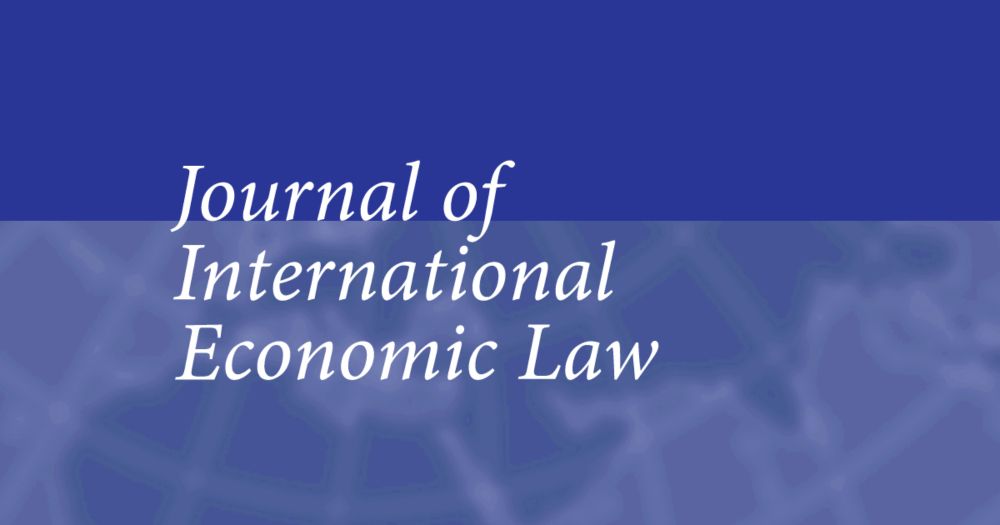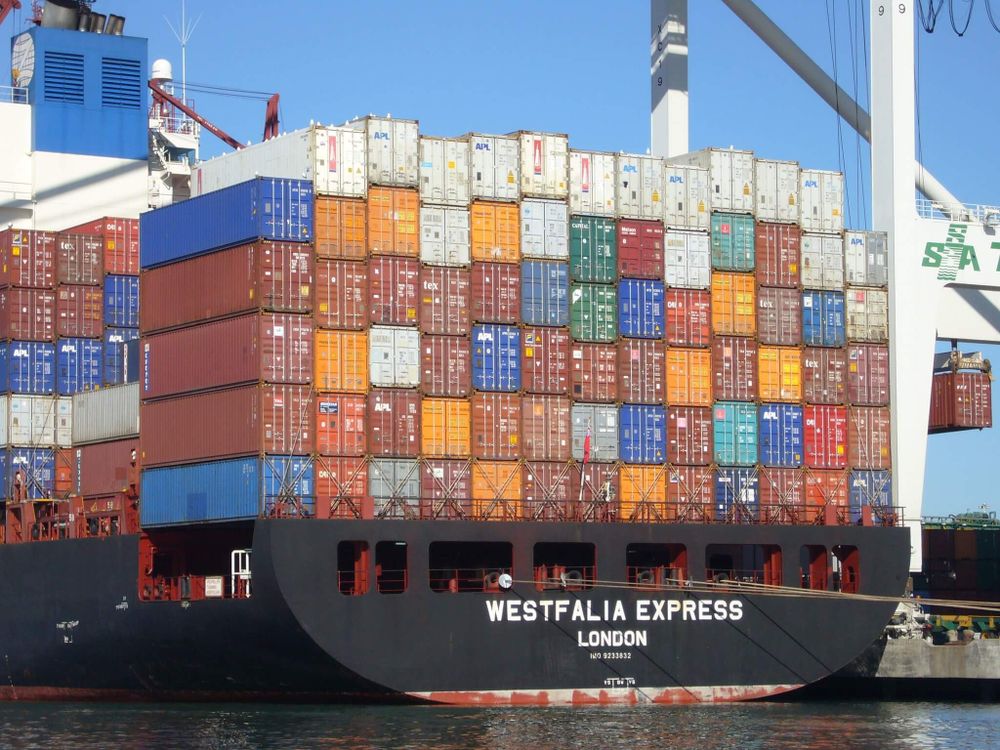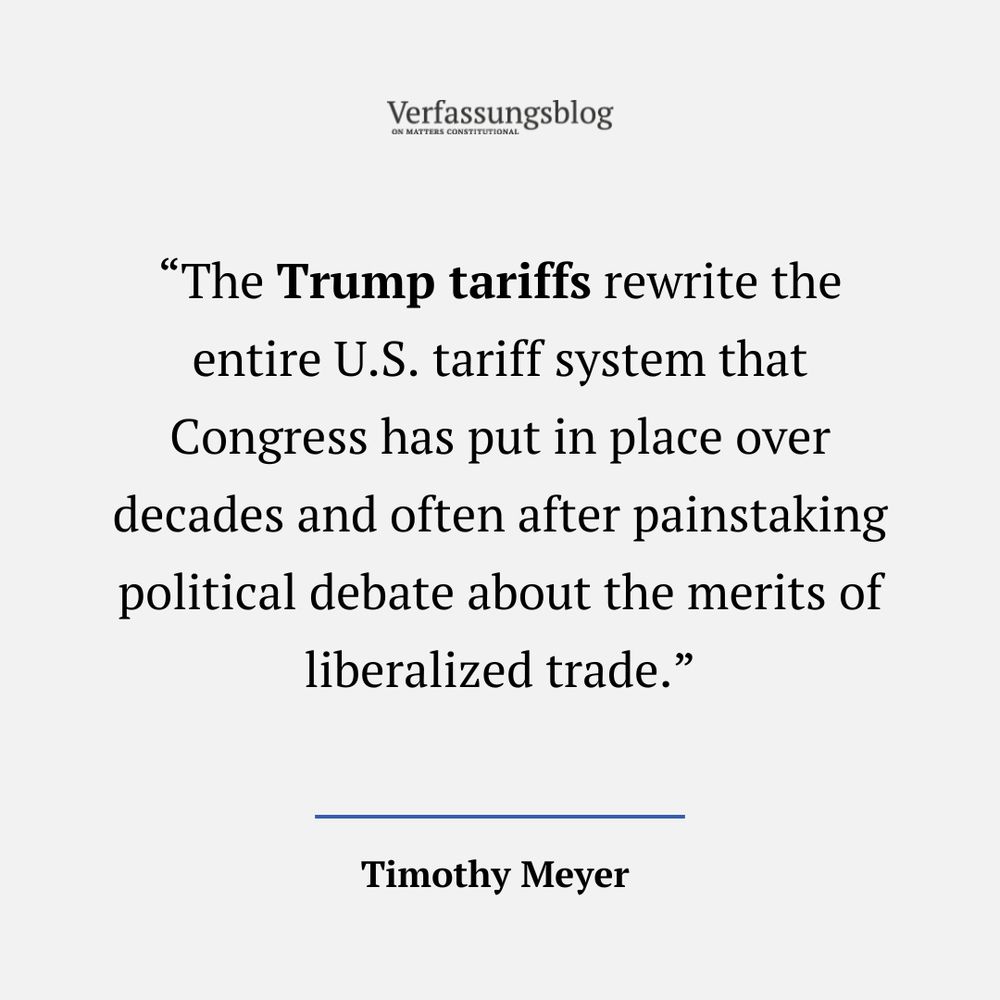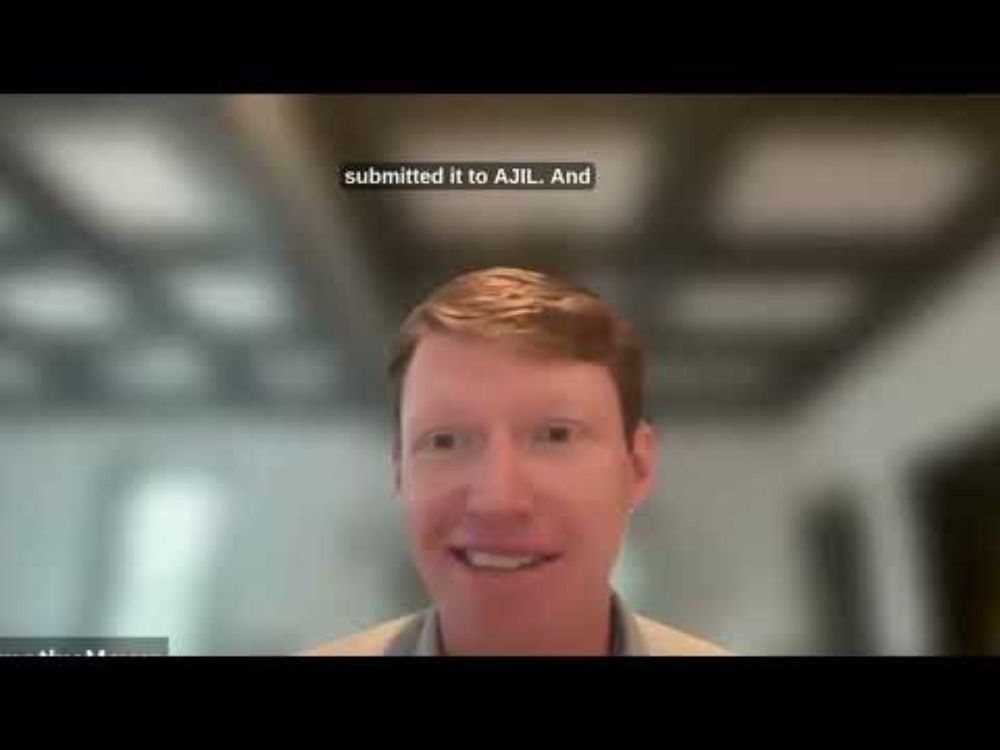In short, originalist research strongly supports the view that the president's art. II powers, whatever they might be with respect to diplomacy and national security, tell us nothing about the scope of his purely delegated power to impose tax imports. /END
22.09.2025 16:34 — 👍 4 🔁 1 💬 0 📌 0
Instead, founding-era presidents continued to defer to Congress in regulating foreign commerce, including in the imposition of embargoes, even when national security was directly implicated by US efforts to stay out of European wars and/or protect US shipping. 9/
22.09.2025 16:32 — 👍 3 🔁 0 💬 1 📌 0
In particular, while presidents claimed the power to set policy internationally & for the executive branch, they did not claim to be able to implement their policy choices as a matter of domestic law--the power that the govt seeks in VOS Selections/Oregon/Learning Resources. 8/
22.09.2025 16:31 — 👍 0 🔁 0 💬 1 📌 0
We walk through the drafting of the Constitution as well, but to keep a long thread short, the Founding Generation's practices in the early years reflected the British experience and the plain reading of the text of the Constitution. 7/
22.09.2025 16:28 — 👍 0 🔁 0 💬 1 📌 0
The Crown could not implement portions of international agreements, including peace treaties, that required trade and tariff concessions w/o parliamentary consent--a fact directly responsive to the govt's argument that POTUS's negotiations require interpreting his authorities broadly 6/
22.09.2025 16:26 — 👍 1 🔁 0 💬 1 📌 0
a few examples: The Framers wrote the Constitution against the backdrop of British law in which the tariff power belonged to Parliament. A chief complaint re: Charles I contributing to his ultimate execution was that he taxed, including specifically by imposing tariffs, w/o parliamentary consent. 5/
22.09.2025 16:23 — 👍 0 🔁 0 💬 1 📌 0
As the case moves to SCOTUS, a key issue will be what the justices make of the overlap between the president's general FA powers and Congress's FA powers. Our research suggests that the government's argument lacks a basis in originalist sources. Read the article for our whole analysis, but . . . 4/
22.09.2025 16:20 — 👍 1 🔁 0 💬 1 📌 0
Economic Security and the Separation of Powers
The U.S. Constitution grants Congress the power “[t]o regulate Commerce with foreign Nations,” but today the exercise of the foreign commerce power resides prim
As we explained in an earlier article, the Fed Cir. largely accepted these claims during litigation over the first Trump admin's tariffs under Section 232. But sitting en banc, it rejected the govt's foreign affairs framing in VOS Selections as applied to IEEPA. 3/ papers.ssrn.com/sol3/papers....
22.09.2025 16:17 — 👍 1 🔁 0 💬 1 📌 0
One of the gov't's central claims in the ongoing tariff litigation is that the president has independent Art. II power over foreign affairs, *and* that tariffs are a matter of foreign affairs, and thus the courts should interpret IEEPA differently than they would interpret other delegations. 2/
22.09.2025 16:13 — 👍 1 🔁 1 💬 1 📌 0
The Foreign Commerce Power
This Article is the first to scrutinize presidential trade authority under the Constitution. The Constitution grants the president no independent power to regul
My new article w/ Kathleen Claussen, The Foreign Commerce Power, is now up on SSRN & forthcoming in @califlrev.bsky.social. We examine the relationship b/w Congress's foreign commerce/tariff authorities & POTUS's foreign affairs powers through an originalist lens. 1/ papers.ssrn.com/sol3/papers....
22.09.2025 16:10 — 👍 9 🔁 4 💬 2 📌 0
The foreign interest point would apply to the tariffs too. There is surely a class of potential plaintiffs who are US companies importing goods they own and that no foreign person has an interest in.
02.08.2025 03:32 — 👍 1 🔁 0 💬 0 📌 0
The CIT op leaned more heavily on the states’ brief for that reason, I think. I think there is also a little disjunction re MQD/ND with the SC-focused lawyers wanting to make that the main issue & lower court judges wanting to look at it as a statutory interpretation question w/ MQD as icing.
02.08.2025 03:31 — 👍 1 🔁 0 💬 0 📌 0
CAFC tariff argument focusing on what interpreting "regulate" to include tax power would do to other statutes. It would also expand the tax power in IEEPA beyond tariffs! Regulate modifies use, transfer, holding, acquisition-gov't argument means IEEPA authorizes sales taxes, property taxes, etc!
31.07.2025 15:06 — 👍 4 🔁 2 💬 0 📌 0

Towards a post-Trump order for the climate crisis
Abstract. The Trump administration has injected a level of chaos into international economic relations. It is worthwhile for policymakers and scholars to t
NEW from me in a Journal of International Economic Law symposium:
Towards a post-Trump order for the climate crisis.
I lay out why, despite setbacks, industrial policy is still the way to address climate change - and how macro and distributional policy can help.
🧵
academic.oup.com/jiel/advance...
25.06.2025 15:24 — 👍 36 🔁 14 💬 3 📌 3
The result is less transparent, stable, and accountable than legislation or ordinary administrative law. We wrote the article before the election last year, but from EOs on tariffs, FCPA, & TikTok Trump 2.0 is accelerating the trend toward presidential regulation dramatically.
18.06.2025 17:34 — 👍 3 🔁 0 💬 0 📌 0
Delighted that Presidential Regulation (w/ @ganeshsitaraman.bsky.social) has been published @ YaleJReg. We argue that presidents increasingly use presidential & foreign affairs powers to regulate the domestic economy in ways that aim to minimize judicial review. /1 www.yalejreg.com/wp-content/u...
18.06.2025 17:32 — 👍 13 🔁 6 💬 1 📌 0
Yesterday, the U.S. Court of International Trade ruled Trump’s emergency tariffs illegal, potentially dealing a blow to his trade leverage and ongoing negotiations with 18 countries.
TIMOTHY MEYER @timlmeyer.bsky.social breaks down the legal limits of presidential tariff power.
29.05.2025 15:27 — 👍 8 🔁 8 💬 0 📌 0
The Trump Admin’s Attempt to Redefine a ‘Foreign Affairs Function’
Courts will likely reject this effort to shield all of the executive’s cross-border actions from Administrative Procedure Act review.
@lawfaremedia.org, Kathleen Claussen and I discuss a new front in the Trump Administration's efforts to evade meaningful judicial review of its actions: an attempt to expand the "foreign affairs" exception to the Administrative Procedure Act:
www.lawfaremedia.org/article/the-...
13.05.2025 18:44 — 👍 3 🔁 3 💬 0 📌 0

The Trump Admin’s Attempt to Redefine a ‘Foreign Affairs Function’
Courts will likely reject this effort to shield all of the executive’s cross-border actions from Administrative Procedure Act review.
In March, Secretary of State Marco Rubio published a notice which purports to regulate economic activity through national security and foreign affairs authorities. Kathleen Claussen and @timlmeyer.bsky.social explore the legality of the notice under the Administrative Procedures Act.
13.05.2025 15:21 — 👍 52 🔁 13 💬 0 📌 0

Quote: The Trump tariffs rewrite the entire U.S. tariff system that Congress has put in place over decades and often after painstaking political debate about the merits of liberalized trade.
Since taking office, President Trump has imposed – or threatened – a steady stream of tariffs on almost any country that catches his attention.
TIMOTHY MEYER (@timlmeyer.bsky.social) argues that Trump does not have the power to impose most of his tariffs.
verfassungsblog.de/trump-tariff...
30.04.2025 13:43 — 👍 8 🔁 5 💬 2 📌 2
YouTube video by Cambridge University Press
AJIL Board of Editors Spotlight: Tim Meyer
AJIL Board member @timlmeyer.bsky.social shares his path into int'l law scholarship, experiences with AJIL early in his career, and how AJIL's review process improves the quality of journal articles.
youtu.be/waZrsu8puB4?...
15.04.2025 13:40 — 👍 4 🔁 1 💬 0 📌 0
Looking forward to this Friday's colloquium, which puts @aratojulian.bsky.social in conversation w/ @timlmeyer.bsky.social to see how trade & investment treaties can make commitments sufficiently credible w/o overcoming the state’s ability to regulate in the public interest.
18.03.2025 12:58 — 👍 5 🔁 2 💬 0 📌 0
Thanks, I'll look forward to reading it! Ours is coming out in JREG too (which I think I forgot to mention but should have).
19.02.2025 01:00 — 👍 1 🔁 0 💬 1 📌 0
We will be revising the piece in light of the current administration’s action before publication later this year and welcome comments on it. /End.
18.02.2025 20:06 — 👍 0 🔁 0 💬 0 📌 0
We think President Trump’s expansive claims of foreign affairs powers over the domestic economy—clearly in evidence during the Biden and first Trump administrations but expanding in frequency and scope now—make plain that a paradigm shift is underway. 9/
18.02.2025 20:06 — 👍 2 🔁 0 💬 1 📌 0
In distributing the piece last year, a lot of people pushed us to say more about how presidential regulation is different from presidential administration. 8/
18.02.2025 20:05 — 👍 0 🔁 0 💬 1 📌 0
Presidential regulation thus differs significantly from ordinary agency regulation and from “presidential administration,” in which the president directs agencies as to how they should use their authorities. 7/
18.02.2025 20:03 — 👍 0 🔁 0 💬 1 📌 0
Finally, presidential regulation has fewer transaction costs, in terms of internal executive branch procedures, both because the president is not subject to the Administrative Procedures Act (APA) and because the president can cut through the normal inter-agency process. 6/
18.02.2025 20:03 — 👍 0 🔁 0 💬 1 📌 0
Second, there is considerably less judicial review of presidential regulation, as opposed to agency regulation, both because the president can often rely on independent constitutional authority unavailable to agencies and because courts are more deferential to the president than agencies. 5/
18.02.2025 20:03 — 👍 0 🔁 0 💬 1 📌 0
While the admin law paradigm has Congress delegating power to agencies, it also delegates broad powers directly to the president. These delegated authorities—along with the president’s own constitutional authority, especially over foreign affairs—form the legal basis for presidential regulation. 4/
18.02.2025 20:02 — 👍 0 🔁 0 💬 1 📌 0
Professor of Law at Duke. Author of The Authoritarian Commons, Chinese Small Property, and Finance against Law. After two decades studying law, I’m still captivated by these questions: What is law? Does law matter? Why?
In-depth, independent reporting to better understand the world, now on Bluesky. News tips? Share them here: http://nyti.ms/2FVHq9v
Law Professor & Political Scientist at @uvalaw.bsky.social; working on legal/political decisionmaking, courts, (im)migration, & international law. 🌍⚖️🛂👩🏻⚖️ Jurist-Derived Judicial Ideology Scores: www.judjis.org
Professor of Law, University of Florida Levin College of Law
Criminal Law, International Law, National Security Law, Transitional Justice, Human Rights
Bio: https://www.zacharykaufman.com/biography/
Publications: http://tinyurl.com/bpaas2b7
Law Prof. @ Washington University in St. Louis. International law, theory, organizations. Corporate actors & the public/private divide.
International Economic Law | Legal Aspects of (Swiss) Democracy | Law of Sustainable Development | Researcher & Professor | Geneva Graduate Institute | University of Zurich | Kalaidos (FH) Law School
https://tradepackages.org
https://sieber-consulting.ch
Dean & Head of School, Sydney Law School, University of Sydney. International law, legal theory, law & technology etc. Latest books: https://tinyurl.com/HelpBookOUP & https://tinyurl.com/2cv626hf
(Views expressed here are mine not those of my employer.)
Professor of International and U.S. Foreign Affairs Law, Columbia Law School. Co-Editor-in-Chief (with Ingrid Brunk) of the American Journal of International Law.
Senior Lecturer in Law, Univ. of Bristol. Int'l economic law & int'l dispute settlement. ISDS, BITs, PTAs, WTO, sometimes ICJ and UNCLOS.
https://research-information.bris.ac.uk/en/persons/joshua-paine
New book: https://t.co/VmaFLRiOrV
International law / international relations / human rights / national security. Giving social media one more try.
Trade trade trade! practice trade law; teach trade policy. I have a webpage tracking trade dispute settlement under FTAs, at: bit.ly/3ilzV0H
Professor of Int’l & EU Law, Diplomatic Academy Vienna. Past: Prof., founding Director CIGAD at King's College London, specialist adviser House of Lords EU Select Committee, Référendaire CJEU
Professor, Duke University. Research Associate, NBER. Co-Editor-in-Chief, American Law and Economics Review. Speaks in movie quotes.
Professor of Law, University of Cincinnati; Co-EIC, International Organizations Law Review; Deputy Editor, Human Rights Quarterly; ILR Blog
Law professor. Editor @justsecurity.org. Working on foreign relations, cybersecurity, and national security.
Professor of Trade Law & Policy, University of Bristol
https://research-information.bris.ac.uk/en/persons/gregory-messenger
Co-founder & co-Director TaPP Network
https://tappnetwork.org
A blog that explores the co-constitution of law and political economy. Part of the @lpeproject.bsky.social. Subscribe to our newsletter: http://lpeproject.org/subscribe/
Associate Professor of Law & Political Science @Duke. Conflict, migration, peacebuilding, transitional justice & humanitarian/development aid. Nonresident @carnegiedcg.bsky.social. Rhymes w/ @jonpetkun.bsky.social. Web: https://law.duke.edu/fac/revkin
Canadian law professor based in the US. I write about legal ethics, access to justice, and the future of law. My views are not those of my employers.



